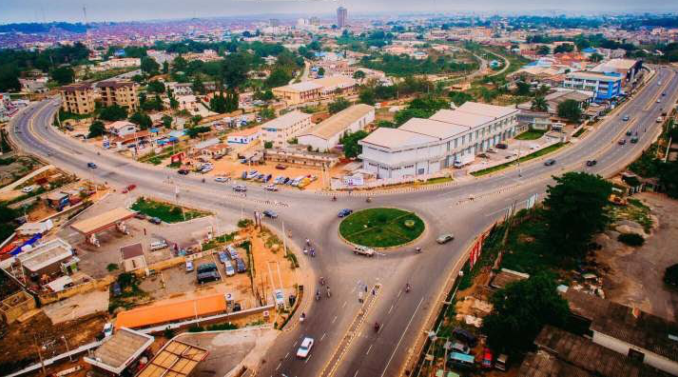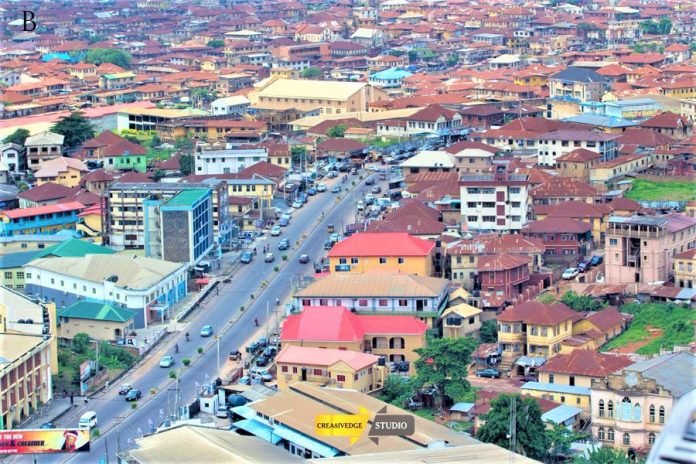
When we think of Nigeria, the first thing that comes to mind is its bustling population—over 200 million people, enough to fill more football stadiums than you can count! But here’s a fun fact: not all the action is packed into the small corners of Lagos traffic jams. While Lagos may be Nigeria’s most famous city for its busy lifestyle, it’s not the biggest city in terms of landmass. Shocking, right?
If you’re wondering which cities take up the most space, you’re in the right place. Nigeria, lovingly called the “Giant of Africa,” has some massive cities spread across its landscape. You’re about to meet the top 20 largest cities by land mass—these are the ‘big boys’ of Nigerian geography. From commercial powerhouses to quiet, sprawling metropolises, each of these cities has its unique character, and yes, some have more land than they even know what to do with.
So, grab a seat and maybe a snack (you’ll need it), as we take a fun and informative tour through Nigeria’s biggest cities in terms of sheer land mass. Spoiler alert: Lagos is not number one, but it’ll still make the list—because, you know, it’s Lagos. Let’s begin our journey through the wide-open spaces of Nigeria.
Contents
- BiggestAdvertisementsCities in Nigeria by Land Mass
- 1. Ibadan (3,080 km²)
- 2. Ogbomosho (2,110 km²)
- 3. Jos (1,821 km²)
- 4. Abuja (1,769 km²)
- 5. Benin City (1,204 km²)
- 6. Lagos (1,171 km²)
- 7. Warri (1,048 km²)
- 8. Akure (991 km²)
- 9. Abeokuta (879 km²)
- 10. Ilorin (765 km²)
- 11. Zaria (563 km²)
- 12. Kano (499 km²)
- 13. Calabar (406 km²)
- 14. Port Harcourt (369 km²)
- 15. Maiduguri (137 km²)
- 16. Owerri (130 km²)
- 17. Enugu (110 km²)
- 18. Kaduna (72 km²)
- 19. Uyo (67 km²)
- 20. Yola (36 km²)
- Top 10 Largest Cities in Nigeria by Land Mass
Biggest
Cities in Nigeria by Land Mass
1. Ibadan (3,080 km²)
- State: Oyo
- Geopolitical zone: Southwest Ibadan
The capital of Oyo State, is the largest city in Nigeria by land mass. Spanning an impressive 3,080 square kilometres, Ibadan city is known for its cultural heritage and historical importance. It is home to Nigeria’s first university, the University of Ibadan, and remains a major centre for trade and education. Ibadan’s proximity to Lagos further enhances its significance as a commercial hub. Ibadan is also one of the most Cheapest cities to live in Nigeria. See Land For Sale In Ibadan Moniya: Own A Plot
2. Ogbomosho (2,110 km²)
- State: Oyo
- Geopolitical zone: Southwest
Ogbomosho is the second biggest city in Nigeria by landmass, occupies 2,110 square kilometers, making it the second-largest city in Nigeria by land area. Established in the 17th century, this city is renowned for agriculture, producing crops like cocoa, rubber, and palm oil. Ogbomosho also hosts Ladoke Akintola University of Technology, making it a notable educational centre.
Name Two Biggest City in Nigeria By Landmass
Ibadan and Ogbomosho are the two biggest cities in Nigeria by landmass. They are both in Oyo state.
3. Jos (1,821 km²)
- State: Plateau
- Geopolitical zone: North Central
Jos, located in the central region of Nigeria, spans 1,821 square kilometers. It is known as one of the coldest cities in Nigeria. Jos sits on a plateau and is recognized for its tourism potential due to its rolling hills and distinct weather. Historically, Jos was a centre for tin mining, and it continues to thrive as an agricultural and administrative city.
4. Abuja (1,769 km²)
- State: Federal Capital Territory (FCT)
- Geopolitical zone: North Central
Abuja is Nigeria’s political capital and covers 1,769 square kilometers. Established in 1976, it was created to replace Lagos as the nation’s capital due to its central location and ample land for expansion. Abuja is home to Nigeria’s seat of government, including the Presidential Complex and the National Assembly. It is one of the top 10 finest cities in Nigeria.
5. Benin City (1,204 km²)
- State: Edo
- Geopolitical zone: Southwest
With a land area of 1,204 square kilometers, Benin City is the capital of Edo State and was once the heart of the ancient Benin Empire. It holds historical significance as one of the ancient cities in Nigeria and is an important commercial hub today, with industries ranging from rubber to oil production.
6. Lagos (1,171 km²)
- State: Lagos
- Geopolitical zone: Southwest
Despite being the most populous city in Nigeria with over 21 million inhabitants, Lagos covers 1,171 square kilometers, making it the sixth-largest by land mass. Lagos is Nigeria’s economic powerhouse, the most developed city in Nigeria, housing several industries, multinational companies, and Africa’s largest film industry, Nollywood.
See>>> Top 10 Most Populated States in Nigeria
7. Warri (1,048 km²)
- State: Delta
- Geopolitical zone: South-South
Warri, along with its twin city Uvwie, spans 1,048 square kilometres. Warri is one of Nigeria’s major oil hubs, playing a pivotal role in the country’s economy. It also serves as the commercial centre of Delta State.
8. Akure (991 km²)
- State: Ondo
- Geopolitical zone: Southwest
Akure is the capital city of Ondo State, covering 991 square kilometres. The city is largely an agricultural hub, with a focus on cocoa production. Akure is also home to the Federal University of Technology, Akure (FUTA), a key educational institution in the country.
9. Abeokuta (879 km²)
- State: Ogun
- Geopolitical zone: Southwest
Abeokuta, covering 879 square kilometres, is the capital of Ogun State. Historically, it was a refuge for the Egba people during the colonial era and today remains a key city in southwestern Nigeria. Abeokuta is known for its granite rocks and its role in Nigeria’s industrialization.
10. Ilorin (765 km²)
- State: Kwara
- Geopolitical zone: North Central
Ilorin, the capital of Kwara State, covers 765 square kilometres. It serves as a significant commercial and educational centre in the north-central region, housing the University of Ilorin, one of Nigeria’s top universities.
11. Zaria (563 km²)
- State: Kaduna
- Geopolitical zone: Northwest
Zaria, with a land area of 563 square kilometres, is one of the oldest cities in Nigeria and is home to Ahmadu Bello University. The city is historically important and plays a vital role in education, agriculture, and commerce in the northwestern region of the country.
12. Kano (499 km²)
- State: Kano
- Geopolitical zone: North Central
Kano, with an area of 499 square kilometres, is one of Nigeria’s oldest cities, dating back centuries. Kano is known for its historical landmarks like the ancient city walls and Kurmi Market. It is a significant commercial centre in northern Nigeria, contributing to the nation’s agricultural and manufacturing industries.
13. Calabar (406 km²)
- State: Cross River
- Geopolitical zone: South-South
Calabar covers 406 square kilometres and is the capital of Cross River State. Known for its beautiful natural setting along the Atlantic coast and Calabar River, the city is a significant tourist destination and a key cultural centre in Nigeria. It is top 5 most peaceful cities in Nigeria.
14. Port Harcourt (369 km²)
- State: Rivers
- Geopolitical zone: South-South
Port Harcourt, the capital of Rivers State, spans 369 square kilometres. It is a key oil city in Nigeria and serves as the headquarters for many multinational oil companies. The city’s economy revolves around oil and gas production.
15. Maiduguri (137 km²)
- State: Borno
- Geopolitical zone: Northeast
Maiduguri is the capital of Borno State and covers 137 square kilometres. It is an important commercial and cultural centre in northeastern Nigeria, despite recent challenges due to insurgent activities. Maiduguri plays a vital role in the trade between Nigeria and neighbouring countries.
16. Owerri (130 km²)
- State: Imo
- Geopolitical zone: Southeast
Owerri is a city with a land area of 130 square kilometers. It serves as the capital of Imo State and is a major educational and administrative centre in southeastern Nigeria. The city is known for its green spaces and growing infrastructure.
17. Enugu (110 km²)
- State: Enugu
- Geopolitical zone: Southeast
Enugu covers 110 square kilometers and is the capital of Enugu State. Known as the “Coal City,” Enugu was historically a major coal mining centre. Today, it is a significant commercial hub in southeastern Nigeria with a growing population.
18. Kaduna (72 km²)
- State: Kaduna
- Geopolitical zone: North Central
Kaduna City covers 72 square kilometers and is the capital of Kaduna State. It is an important administrative centre in northern Nigeria, with a rich history in trade, industry, and education.
19. Uyo (67 km²)
- State: Akwa Ibom
- Geopolitical zone: South-South
Uyo is the capital of Akwa Ibom State, covering 67 square kilometers. Known for its well-planned layout and serene environment, Uyo is a rapidly growing city in southern Nigeria with a focus on commerce and industry. It is top 10 cleanest cities in Nigeria,
20. Yola (36 km²)
- State: Adamawa
- Geopolitical zone: Northeast
Yola, with an area of 36 square kilometres, is the capital of Adamawa State. It serves as an important administrative and educational center in northeastern Nigeria, housing institutions like the American University of Nigeria.
See>>> 10 Largest States in Nigeria by Land Mass
Top 10 Largest Cities in Nigeria by Land Mass
- Ibadan
- Ogbomosho
- Jos
- Abuja
- Benin city
- Lagos
- Warri
- Akure
- Abeokuta
- Ilorin
Conclusion
These 20 largest cities in Nigeria by land mass showcase the diversity of the country’s geography and its expanding urban landscapes. From historical cities like Ibadan and Kano to the modern-day capital of Abuja, Nigeria’s cities each play unique roles in the nation’s economy, culture, and administration.
- Follow me on TikTok for quick tips and behind-the-scenes tours
- Subscribe to my YouTube channel for in-depth videos and property showcases
- Follow me on Facebook for updates, listings, and real estate advice



Leave a Reply